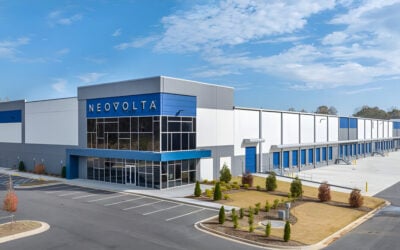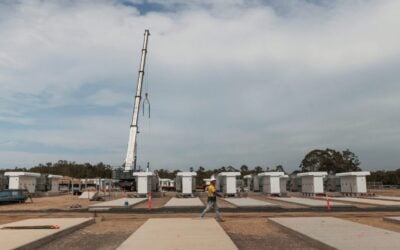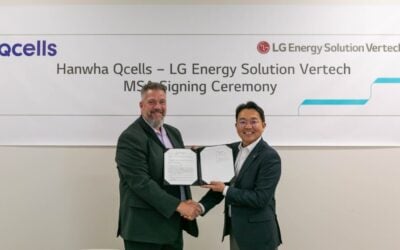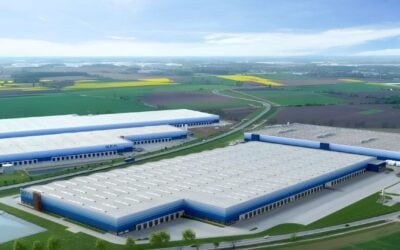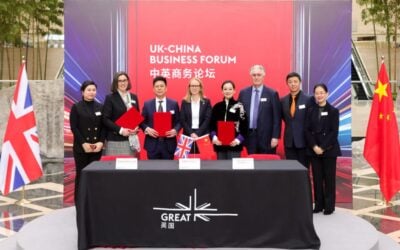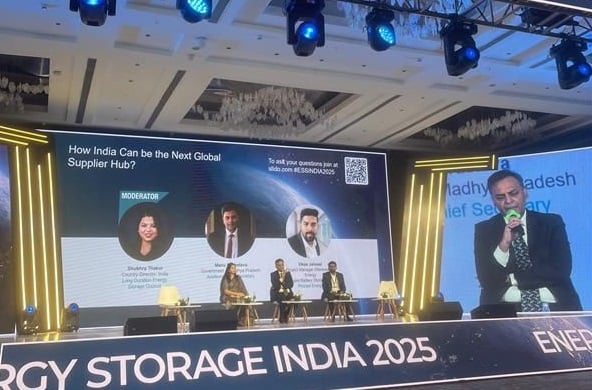
Partnerships will determine whether India can emerge as a global hub for battery manufacturing and energy storage.
This was a key takeaway from a discussion between industry leaders and policymakers at the Energy Storage Summit India 2025, held in Greater Noida last week by our publisher, Solar Media.
During the panel discussion titled ‘How India Can Be the Next Global Supplier Hub?’, moderated by Shubhra Thakur, country director – India, Long Duration Energy Storage Council (LDES Council), panelists underscored that India’s ambitions to become a manufacturing powerhouse depend on ecosystem development, technology partnerships, and policy coherence across ministries.
Thakur said that India’s growing energy demand and the corresponding need for large-scale storage infrastructure. Citing projections from the National Electricity Plan, she said India’s energy storage requirement could reach 400GWh by 2032 – a figure that dwarfs the country’s current domestic cell production capacity of just 2GWh.
Try Premium for just $1
- Full premium access for the first month at only $1
- Converts to an annual rate after 30 days unless cancelled
- Cancel anytime during the trial period
Premium Benefits
- Expert industry analysis and interviews
- Digital access to PV Tech Power journal
- Exclusive event discounts
Or get the full Premium subscription right away
Or continue reading this article for free
“Globally, around 500GWh of annual battery manufacturing capacity exists today, but much of it is concentrated in a single region,” she said. “As supply chains diversify and countries seek to de-risk from regional dependencies, India stands at a pivotal moment – we must decide whether to remain a large energy market or become a global supplier where the entire value chain thrives.”
Collaboration over isolation
Manu Srivastava, additional chief secretary, Government of Madhya Pradesh, urged policymakers and industry stakeholders to move away from protectionism and towards global collaboration.
“Over the past few years, we seem to have developed a tendency to identify certain ‘villains’ in the global economy – to see the world as a film with clear heroes and antagonists,” he said. “But earlier, we believed in the world as a global village, where efficiency and collaboration determined progress. Returning to that mindset would be far more effective.”
He argued that creating barriers to technology, trade, or knowledge transfer is counterproductive to India’s ambitions.
“If our goal is to lower costs domestically and become a robust supply hub, we cannot afford isolation. We must work with global partners, learn from established ecosystems, and leverage their strengths to accelerate our own growth,” he added.
“When something is looked after by more than one department, it often ends up being looked after by none,” he noted, referring to the fragmented oversight of renewable manufacturing across ministries. “However, coordination is improving, and several states are taking proactive steps.”
Srivastava highlighted the Mohasa-Babai industrial area in Madhya Pradesh’s Shajapur district, developed to promote renewable manufacturing. The zone offers incentives, including capital subsidies, R&D grants, and training programmes, to attract investors in clean energy and battery production.
Bridging the manufacturing gap
Vikas Jaiswal, project manager for renewable energy and battery storage at Indian independent power producer (IPP) Prozeal Energy, said that while India has made strides in supporting technologies like battery management systems (BMS) and liquid cooling systems, the country still depends heavily on imported battery cells – which account for nearly 80% of total battery system costs.
“At present, we mainly assemble imported cells into packs and integrate them into storage systems,” Jaiswal said. “To move forward, we need to build an integrated ecosystem — from raw material processing and cell manufacturing to recycling.”
He added that India currently lacks the expertise in critical processes such as lithium purification and remains reliant on international suppliers.
“Partnerships with global companies that already have advanced ecosystems and automation experience are essential,” he said. “We also need strong domestic R&D, robust testing and validation facilities, and skilled engineers who can drive innovation at home.”
Jaiswal credited the government’s Advanced Cell Chemistry Production Linked Incentive (PLI) scheme as a strong starting point but said deeper collaboration between public and private sectors would be vital to scale manufacturing and achieve cost competitiveness.
Building a resilient ecosystem
Closing the discussion, Thakur noted that India’s policy foundation – through initiatives such as Make in India and the PLI programme – is well established. However, she said the next phase must focus on execution and ecosystem integration.
“The way forward is not isolation but collaboration – across technologies, industries, and governments,” Srivastava said. “Only through coordinated action and innovation can India evolve from a major energy market into a reliable global supplier hub for the clean energy era.”

